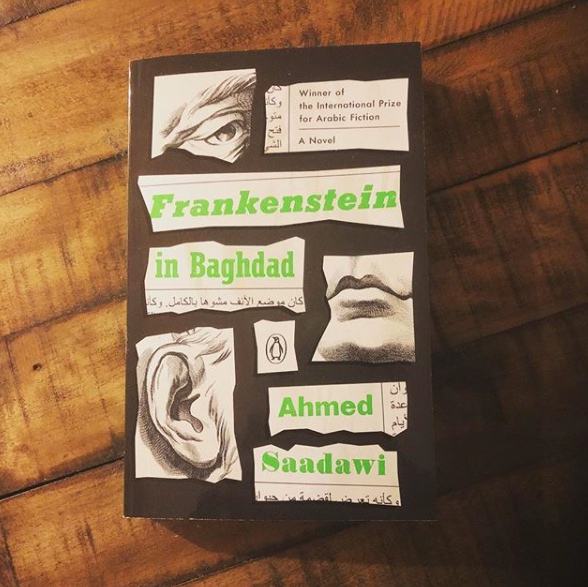I came across this novel while browsing in a bookstore, without any real intent to make a purchase. When I came across Frankenstein in Baghdad by Ahmed Saadawi, I was unfamiliar. The title was enough, and I read the synopsis. Then I bought it.
In 2004 a junk dealer collects body parts he finds in the street. War has decimated the community, and often people are destroyed by means of explosive violence. Our junk dealer, Hadi, creates a full corpse of miscellaneous body parts as a symbolic offering to no one in particular. The body becomes animated by supernatural means, and is burdened by the need to seek revenge on each ‘criminal’ responsible for each individual body part that makes up the monster. The premise is morbid, but powerful and thought provoking.
Saadawi offers a vivid community composed of those burdened by the war, and those taking advantage of it. There’s a full page that lists the cast of characters at the start of the narrative. An elderly woman of Christian faith believes the monster to be her son, having finally returned home after leaving for war twenty years prior. The junk dealer is an alcoholic storyteller, so the detailed confessions to his audience are received with entertained dismissal. A real estate agent takes advantage of people abandoning their properties, as the chaos of war makes it easy to claim their assets. There’s a full society in the cast, showing the beautiful and wretched range of human dynamics, burdened by the anxieties of war. He writes a universal truth with lines like, “the tragedies we’re seeing stem from one thing-fear” (123).
The monster is complex, and changes over time. It speaks well, and in tones that change. In the beginning the monster believes in a purpose, for, “He was a composite of victims seeking to avenge their deaths so they could rest in peace. He was created to obtain revenge on their behalf” (130). The monster states that, “there is a moral and humanitarian obligation… to bring about justice in this world, which has been totally ravaged by greed, ambition, megalomania, and insatiable bloodlust” (143). As the monster attains justice, or exacts revenge, the body part that corresponds with the deed decays at an accelerated rate. In order to maintain the self and momentum, the monster replenishes the body parts with other body parts, placing itself into a violent loop. The monster becomes conflicted, and is concerned about each new part; are they innocent enough to merit revenge? The answer doesn’t matter, as the monster continues to do what it does.
The monster is deemed a criminal, and all sides vilify the other as the source. Authorities make chase, but even with mystical astrologists, the monster remains elusive. The chase is compromised from the start, as the cost of ego cheapens life.
I enjoyed this book. Dark themes, and social commentary on a place that is not my home offers insight to the plight of others, set to a backdrop of the wretched and fantastic. Frankenstein in Baghdad is worth the read, if you can stomach it.
